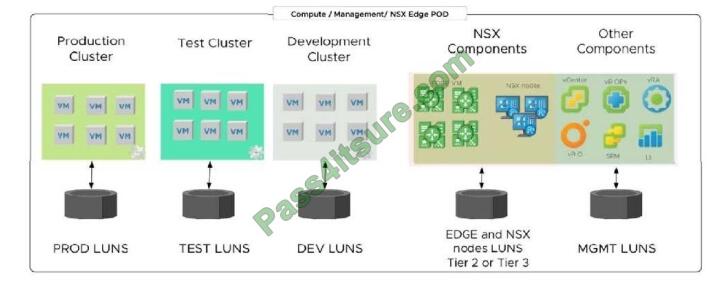Released the latest VMware 3V0-41.19 exam dumps! You can get 3V0-41.19 VCE dumps and 3V0-41.19 PDF dumps from Pass4itsure, (including the latest 3V0-41.19 exam questions), which will ensure that your 3V0-41.19 exam is 100% passed! Pass4itsure 3V0-41.19 dumps VCE and PDF — https://www.pass4itsure.com/3v0-41-19.html Updated!
VMware 3V0-41.19 Exam Dumps
[100% free] 3V0-41.19 pdf dumps https://drive.google.com/file/d/13vSU6RxF4TeHr1dTHVcDH6zv41RpBQ2J/view?usp=sharing
VMware VCAP-NV Design 2020 3V0-41.19 Practice Test 1-13
QUESTION 1
An architect is helping an organization with the Logical Design of an NSX-T Data Center solution. This information was
gathered during the Assessment Phase:
1.
NSX-T will span across two sites for disaster recovery.
2.
Public Load Balancer VIP should be accessible from a secondary site.
3.
Distributed Firewall Policies should be available at a secondary site.
4.
Routing capabilities should be maintained after failure.
5.
NAT capabilities are required.
Which two should the architect include in their design? (Choose two.)
A. Use IP sets or groups to configure DFW rules.
B. Use MTU to 1550 between sites.
C. Use of the same ISPs across sites.
D. Use two separate ISPs across sites.
E. Set MTU to 1500 between sites.
Correct Answer: BC
https://docs.vmware.com/en/VMware-NSX-T-DataCenter/2.4/administration/GUID-5D7E3D43-6497-4273-99C1-77613C36AD75.html Though MTU recommended at 1600
or higher, docs state the bare minimum is 1550 … Minimum MTU for VMware NSX ? … Outside MTU for IPv4 without
Internal Guest OS dot1q Tagging = 20 + 8 + 8 + 14 + 1500 = 1550 byte–vetted
QUESTION 2
Refer to Exhibit:

An NSX-T architect has been asked to review and recommend improvements for an NSX-T Data Center Logical Design,
as shown in the drawing. The design must allow workload bursts for tenants to and from the public cloud and
accommodate 30% yearly growth.
What two VMware recommended changes will Improve the Logical design? (Choose two.)
A. A separate POD is required for the NSX Edge nodes since the amount of traffic will be heavy.
B. An additional POD will be required to pivot workloads to Public Cloud.
C. Automation tools will be required to reduce time for workloads to be vMotioned.
D. Load balancers should be added to the design to support bursts from the Public Cloud.
E. NSX-T Datacenter components needs to be placed on the Public Cloud for cost reduction.
Correct Answer: CD
You aren\\’t placing NSX-T components in the cloud so (E) is wrong. It talks about bursting “to and from” the cloud,
which lends itself to possibly being a VMware HCX (automation tools) play for (C) (A) With a whole separate “POD”
(covering everything in the graphic) based on this logical design would be overkilled for the NSX Edges (B) no additional
pods are required for pivoting/moving workloads to the public cloud
QUESTION 3
An architect is helping an organization with the Logical Design of an NSX-T Data Center solution. This information was
gathered during the Assessment Phase:
1.
There Isn\\’t much budget available for a new off-shore site.
2.
The new site is decentralized and no communication with the main data center is required.
3.
The design will need to cater for availability, upgrades, and failure scenarios.
Which three should the architect recommend In their design? (Choose three.)
A. Collapse the Management/Edge/Compute cluster.
B. A Shared Edge/Management cluster and one for Compute.
C. Separate the hosts physical NICs for VSS and N-VDS.
D. Install a minimum 4 ESXi hosts In the site.
E. Make all pNICs part of N-VDS and VMKs will be migrated.
F. Install a minimum of 6 ESXi hosts in the site.
Correct Answer: ACD
Limited budget for new site means collapsing of mgmt., edge, and compute provides the best value at lowest cost. NSXT can fully operate with 4 esxi hosts (no need for 6) as that is more a requirement of VCF/vSAN. Because you are
running NSX Edges you should run a vSS or vDS for vmkerneland edge traffic and a N-vDS for NSX-T overlays traffic.
Each vSwitch requiring its own set of pNics https://blogs.vmware.com/networkvirtualization/2018/10/flexibledeploymentoptions-for-nsx-t-edge-vm.html/
QUESTION 4
An architect is helping an organization with the Conceptual Design of an NSX-T Data Center solution. This information
was gathered by the architect during the Discover Task of the Engagement Lifecycle:
1.
There are applications which use IPv6 addressing.
2.
Network administrators are not familiar with NSX-T Data Center solutions.
3.
Hosts can only be configured with two physical NICs.
4.
There is an existing management cluster to deploy the NSX-T components.
5.
Dynamic routing should be configured between the physical and virtual network.
6.
There is a storage array available to deploy NSX-T components.
Which constraint was documented by the architect?
A. There are applications which use IPv6 addressing.
B. There are enough CPU and memory resources in the existing management cluster.
C. Dynamic routing should be configured between the physical and virtual network.
D. Hosts can only be configured with two physical NICs.
Correct Answer: D
The only constraint listed is about the 2 pNICs per host.
QUESTION 5
A customer wants to place their NSX Managers in different subnets. Which would an architect recommend to support
the request?
A. Use a cluster Virtual IP.
B. Use round-robin DNS.
C. Use a load balancer.
D. Use NAT.
Correct Answer: C
“With NSX-T 2.4 it is also possible to create a High Available NSX-T Cluster using an external Load Balancer which can
load balance traffic from GUI, API clients and CMP Platforms to each NSX-T Manager. In this configuration NSX-T
Managers can be in different subnets.” http://www.cloudxtreme.info/nsx-t-manager-clustering/–vetted
QUESTION 6
An architect is helping an organization with the Logical Design of an NSX-T Data Center solution. This information was
gathered during the Assessment Phase:
1.
On premises deployment required.
2.
Use the existing network infrastructure.
3.
ESXi hosts have 2 pNICs with only 1 available for use.
4.
High availability will be required across all ports in any proposed solution.
5.
N-VDS will be required across the infrastructure in the future.
Which should the architect include in their design?
A. Use N-VDS for management and workload traffic.
B. Use a VDS for management traffic and N-VDS- for workload traffic.
C. Use VDS for management and workload traffic.
D. Use a N-VDS for management traffic and VDS- for workload traffic.
Correct Answer: A
Only way to keep high availability and use NSX-T 2.4 N-VDS will be to migrate to N-VDS with collapsed management
and workload on the same vSwitch with both pNICs.
QUESTION 7
An architect is helping an organization with the Logical Design of a Layer 2 bridging solution. This information was
gathered during the Assessment Phase:
1.
Workloads are running on ESXI hosts.
2.
Workloads are running on KVM hosts.
3.
Workloads on both type of hypervisors should use bridging services.
4.
VLAN 50 is used for Tier-0 uplink connectivity.
Which should the architect include in their design?
A. Create an NSX Edge Bridge Cluster and configure the bridging profile with VLAN 60.
B. Create an ESXi Bridge Cluster and configure the bridging profile with VLAN 60.
C. Create an NSX Edge Bridge Cluster and configure the bridging profile with VLAN 50.
D. Create an ESXi Bridge Cluster and configure the bridging profile with VLAN 50.
Correct Answer: C
https://docs.vmware.com/en/VMware-NSX-T-Data-Center/2.3/com.vmware.nsxt.admin.doc/GUIDE57A4794-93BF-4E1C-B5D2-23C575C00EEC.html VLAN 50 is used in the example -Given that along with required
support for ESXi and KVM, and given that KVM is not supported on ESXi Bridge Cluster, C would be the correct answer
https://docs.vmware.com/en/VMware-NSX-T-Data-Center/2.3/com.vmware.nsxt.admin.doc/GUID-7B21DF3DC9DB-4C10-A32FB16642266538.html–vetted You can configure layer 2 bridging using either ESXi host transport nodes or NSX Edge transport nodes. Edge bridging is preferred over ESXi bridging.
QUESTION 8
An architect is helping an organization with the Logical Design of an NSX-T Data Center solution. This information was
gathered during the Assessment Phase:
1.
Data between two networks connected over a public network needs to be encrypted.
2.
Certificate authentication is required.
3.
Dynamic route learning is preferred.
Which should the architect include in their design?
A. Deploy a Tler-0 gateway in Active/Active mode. Configure policy-based IPSec VPN with SHA256withRSA as the
hash algorithm.
B. Deploy a Tler-0 gateway In Active/Active mode. Configure route-based IPSec VPN with SHA512wlthRSA as the hash
algorithm.
C. Deploy a Tier-0 gateway in Active/Standby mode. Configure route-based IPSec VPN with SHA512withRSA as the
hash algorithm.
D. Deploy a Tier-0 gateway in Active/Standby mode. Configure policy-based IPSec VPN with SHA256withRSA as the
hash algorithm.
Correct Answer: C
F- For IP-Sec, Tier 0 Gateways must be in Active/Standby. Route-based IPSec VPN is required for dynamic route
learning https://docs.vmware.com/en/VMware-NSX-T-Data-Center/2.4/administration/GUID-C0E5AF10-576D-493AA079-C4C95D8F5373.html https://docs.vmware.com/en/VMware-NSX-T-Data-Center/2.4/administration/GUIDDF689847-252E-451E-84B5-DB507CC010AC.html
QUESTION 9
Which is associated with the Discover Task of the Engagement Lifecycle?
A. Create and document the logical and virtual design.
B. Gather and document requirements, assumptions and constraints.
C. Build, deploy, implement and test the design.
D. Measure performance against customer\\’s requirements.
Correct Answer: B Discovery is part of the initial conceptual design (RRCA)
QUESTION 10
Which two VMware recommendations should an architect follow when configuring top of rack (ToR) switches in an NSXT Data Center environment? (Choose two.)
A. Modify the Spanning Tree Protocol to increase the time to transition to the forwarding state.
B. Configure redundant physical switches to enhance availability.
C. Use only IPv4 addressing in all deployments.
D. Configure switch ports that connect to ESXi host manually as trunk ports.
E. Configure switch ports with a Dynamic Trunking Protocol.
Correct Answer: BD
https://docs.vmware.com/en/VMware-Validated-Design/5.1/sddc-architecture-and-design-for-vmware-nsxt-workloaddomains/GUID-A7CF1DFE-9C2D-4483-8F68-49C76135E460.html–vetted
QUESTION 11
An architect is helping an organization with the Physical Design of an NSX-T Data Center solution. This information was
gathered during the Assessment Phase:
1.
There Is a critical application used by the Finance Team.
2.
The critical application has an availability and recoverability SLA of 99.99%.
3.
The critical application Is sensitive to network changes.
Which two should an architect include in their design? (Choose two.)
A. Install and configure hosts with 100Gbps physical NICs.
B. Configure Tler-0 gateway for eBGP and ECMP.
C. Configure Tier-1 gateway for eBGP and ECMP.
D. Enable BFD on Tier-0 gateway.
E. Configure multiple static routes on Tier-1 gateway.
Correct Answer: BD Answer B is NSX-T Tier-0 Gateway Best Practice. Dump recommended “E”, but having `multiple static routes on Tier-1
gateway\\’ in and of itself does not lend to high-reliability HA (Four 9\\’s). BFD is used in physical networking to rapidly
detect edge node failure and expedite re-convergence –vetted
QUESTION 12
Which type of design includes vendor models, hostnames, IP Addresses, port connections, logical unit number sizes,
and number of CPUs?
A. High-Level Design
B. Physical Design
C. Logical Design
D. Conceptual Design
Correct Answer: B
https://www.jeffreykusters.nl/2018/06/25/breaking-down-the-conceptual-design-rcars-and-amprs-vcdx-style/
QUESTION 13
An architect is helping an organization with the Physical Design of an NSX-T Data Center solution. This information was
gathered during a workshop:
1.
There are six hosts and hardware has already been purchased.
2.
The customer is planning a collapsed Management/Edge/Compute cluster.
3.
Each host has two 10Gb NICs connected to a pair of ToR switches.
4.
There should be no single point of failure in any proposed design.
Which virtual switch design should the architect recommend to the organization?
A. Create an NSX-T Virtual Distributed Switch (N-VDS) for Management VMkernal and overlay traffic and assign a new
virtual NIC.
B. Create an NSX-T Virtual Distributed Switch (N-VDS) for Management VMkernel and overlay traffic and assign both
NICs.
C. Create an NSX-T Virtual Distributed Switch (N-VDS) for Management VMkernel traffic and assign one NIC. Also,
create an NSX-T Virtual Distributed Switch (N-VDS) for overlay traffic and assign one NIC.
D. Create a vSphere Distributed Switch (vDS) for Management VMkernel traffic and assign one NIC. Also, create an
NSX-T Virtual Distributed Switch (N-VDS) for overlay traffic and assign one NIC.
Correct Answer: B
The only way to have N.S.P.o.F is a single N-vDS design. Virtual NICs don\\’t help the pNIC availability issue
Pass4itsure Discount Code 2020
Please read the picture carefully to get 12% off!

P.S.
Passing the VMware 3V0-41.19 exam is no more dream. Free share all the resources: Latest 3V0-41.19 practice questions, latest 3V0-41.19 pdf dumps, 3V0-41.19 exam video learning. Visit https://www.pass4itsure.com/3v0-41-19.html exam dumps with the latest questions.